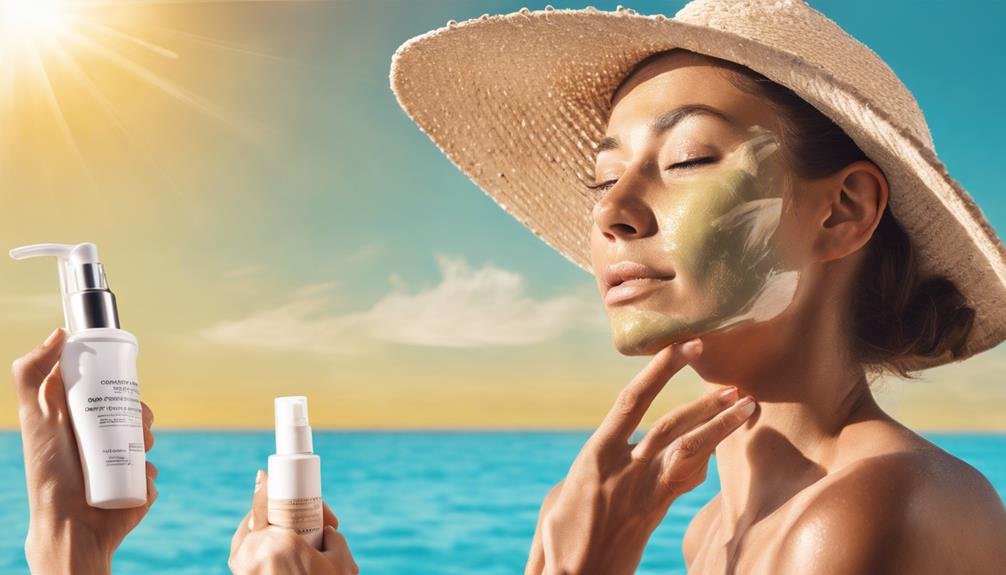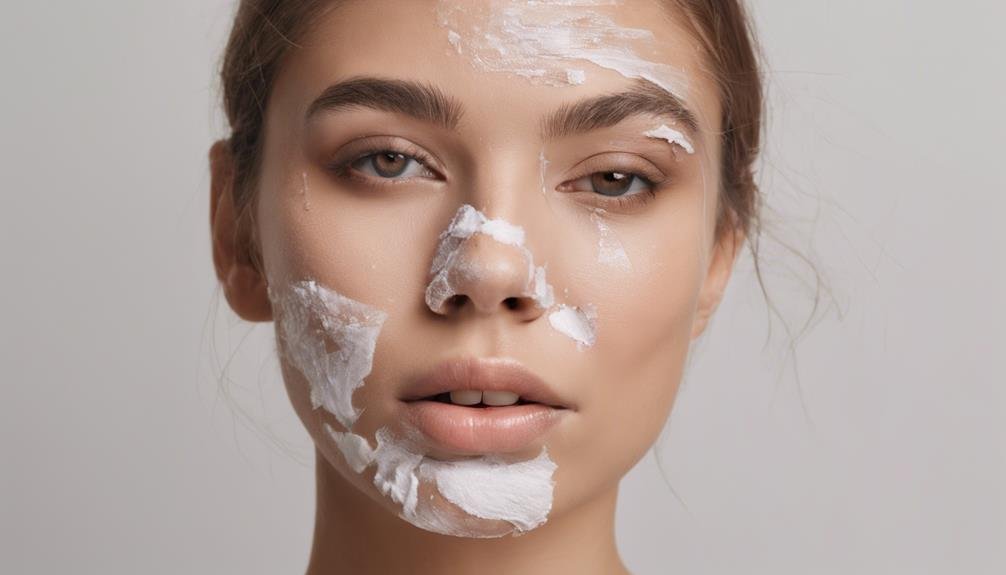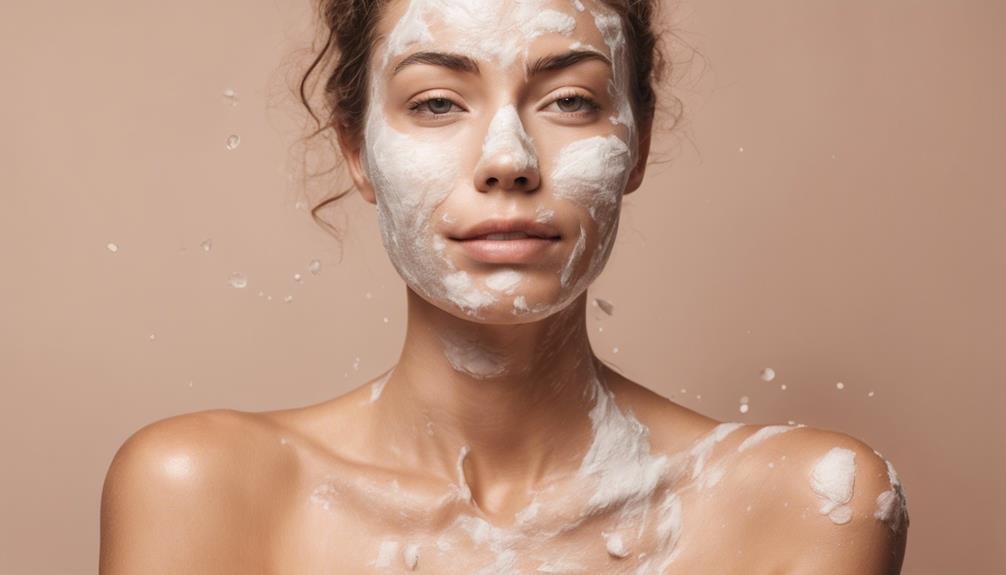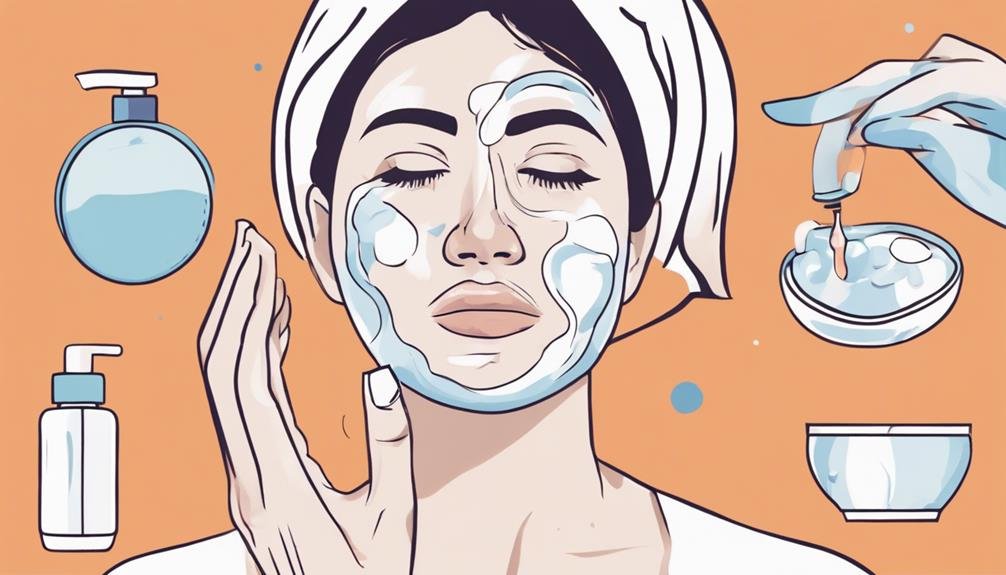Imagine your skin as a delicate flower garden; just like plants need water and sunlight to thrive, your skin requires proper care to blossom. However, just as a forgotten garden can wither, your skin too can suffer from common skincare mistakes. From neglecting sunscreen to sleeping with makeup on, each misstep can hinder your skin's natural radiance. Let's explore these pitfalls and learn how to cultivate a healthy skincare routine that nurtures your skin back to life.
Skipping Sunscreen
Are you guilty of skipping sunscreen in your daily skincare routine? Sunscreen application is crucial for protecting your skin from the harmful effects of UV radiation. UV rays can lead to premature aging, sunburn, and an increased risk of skin cancer. By incorporating sunscreen into your daily skincare regimen, you provide your skin with the necessary UV protection it needs to stay healthy and youthful.
When applying sunscreen, ensure you use a broad-spectrum formula with SPF 30 or higher. Apply it generously to all exposed areas of skin, including your face, neck, arms, and any other areas not covered by clothing. Reapply every two hours, especially if you're sweating or swimming.
Remember that sunscreen isn't just for sunny days – UV rays can penetrate clouds and cause damage even on overcast days.
Over-exfoliating
Skipping sunscreen can pose serious risks to your skin's health, but another common skincare mistake to watch out for is over-exfoliating. Exfoliating is beneficial for removing dead skin cells and revealing fresh skin, but doing it too frequently or aggressively can damage your skin barrier. It's essential to find the right balance in exfoliating frequency to prevent irritation and sensitivity.
When it comes to exfoliating methods, there are two main types: physical and chemical exfoliation.
Physical exfoliation involves using scrubs or tools to manually slough off dead skin cells, while chemical exfoliation involves using acids like AHAs or BHAs to dissolve them. Both methods can be effective when used correctly, but overdoing it can lead to redness, dryness, and even breakouts.
To avoid over-exfoliating, it's recommended to exfoliate 1-3 times a week, depending on your skin type. Be gentle with your skin, choose the right products for your skin concerns, and always follow up with hydrating and nourishing skincare to keep your skin healthy and glowing.
Not Removing Makeup Properly
Improperly removing makeup can have detrimental effects on your skin's health and appearance. Makeup removal is a crucial step in your skincare routine that shouldn't be overlooked. Here are some reasons why proper makeup removal is essential for maintaining healthy skin:
- Prevents clogged pores: Leaving makeup on overnight can clog your pores, leading to breakouts and dull skin. Properly removing makeup ensures that your pores are clean and can breathe.
- Allows for better skincare absorption: Makeup acts as a barrier, preventing your skincare products from being fully absorbed. By thoroughly removing makeup, you allow your skincare products to penetrate the skin more effectively, maximizing their benefits.
- Reduces the risk of skin irritation: Makeup residues left on the skin can cause irritation and inflammation. By removing makeup properly, you minimize the risk of skin sensitivities and maintain a healthy skin barrier.
Using Harsh Products
Using harsh products on your skin can have negative consequences that may hinder your skincare goals. It's essential to be gentle with your skin to maintain its health and appearance.
Opt for gentle cleansers that effectively remove dirt and impurities without stripping away your skin's natural oils. Harsh cleansers can disrupt the skin's moisture barrier, leading to dryness, irritation, and even breakouts.
When choosing skincare products, prioritize those made with natural ingredients. Natural ingredients like aloe vera, green tea extract, or chamomile have soothing and nourishing properties that can benefit your skin without causing harm.
Harsh chemicals can cause inflammation, redness, and long-term damage to your skin.
Ignoring Hydration
Neglecting proper hydration in your skincare routine can have detrimental effects on your skin's health and appearance. Maintaining the right hydration balance is crucial for a glowing and healthy complexion. Here are some essential points to consider:
- Hydration Balance: Your skin needs adequate hydration to function optimally. Without enough moisture, your skin can appear dull, feel tight, and even become more prone to wrinkles and fine lines.
- Moisture Retention: Proper hydration helps your skin retain moisture, creating a protective barrier against external aggressors like pollution and UV rays. This barrier also prevents water loss, keeping your skin plump and youthful.
- Hydration Routine: Incorporate hydrating products like serums, moisturizers, and face masks into your daily skincare regimen. Choose products with ingredients like hyaluronic acid and glycerin to boost moisture retention and maintain a healthy skin barrier.
Picking at Blemishes
Frequent picking at blemishes can lead to negative consequences for your skin's health and appearance. When you pick at blemishes, you risk causing skin damage and increasing the likelihood of scarring. Picking at acne lesions can worsen inflammation, push bacteria deeper into the skin, and delay the healing process.
The trauma caused by picking can also result in hyperpigmentation, making the blemish more noticeable even after it heals.
Excessive picking can lead to long-term skin damage, affecting not only the appearance but also the overall health of your skin. The risk of scarring increases significantly when you constantly touch and manipulate your blemishes. It's essential to resist the urge to pick or squeeze blemishes to prevent these negative outcomes.
Instead of picking at your skin, opt for gentle skincare routines and consider seeking professional advice for treating blemishes effectively. By avoiding the temptation to pick at blemishes, you can help maintain your skin's health and prevent unnecessary scarring.
Not Patch Testing New Products
To ensure the safety and compatibility of new skincare products with your skin, it's crucial to conduct a patch test before incorporating them into your routine. Sensitivity testing can help prevent allergic reactions that may result from using products that aren't suitable for your skin. Follow these steps for an effective patch test:
- Choose a small area on your inner arm or behind your ear to apply a small amount of the new product.
- Leave the product on for 24 hours to observe any signs of redness, itching, or irritation.
- If you experience any negative reactions during this time, avoid using the product on your face to prevent potential allergic reactions.
Neglecting the Neck and Hands
Proper skincare goes beyond just your face; it extends to areas often overlooked, such as the neck and hands. Neglecting these areas can lead to visible signs of aging, like neck wrinkles and hand aging.
The skin on your neck is delicate and prone to developing wrinkles due to constant movement and exposure to the sun. To combat this, make sure to extend your skincare routine down to your neck, using moisturizers and sunscreen.
Similarly, your hands are often exposed to environmental stressors and can show signs of aging faster than other parts of your body. To prevent premature aging, apply hand cream regularly and protect them from the sun.
Forgetting to Reapply Sunscreen
Consistent application of sunscreen is crucial for protecting your skin from the harmful effects of UV radiation. Remember, sunscreen shouldn't be a one-time application; you need to reapply it throughout the day to maintain its effectiveness. Forgetting to reapply sunscreen can leave your skin vulnerable to sun damage, premature aging, and even skin cancer.
Here are some important points to keep in mind about sunscreen application and sun protection:
- Frequency: Reapply sunscreen every 2 hours, or more often if you're sweating or swimming.
- Amount: Use a sufficient amount of sunscreen to cover all exposed areas of your skin adequately.
- Sunscreen Types: Different activities may require different types of sunscreen, such as water-resistant formulas for swimming or sports.
Sleeping With Makeup on
Ensuring your skin remains healthy and radiant involves more than just a morning and evening skincare routine. One crucial step often overlooked is makeup removal before bed. Sleeping with makeup on can have detrimental effects on your skin health. Makeup can clog pores, leading to breakouts and dull skin.
Throughout the day, makeup accumulates dirt, bacteria, and pollutants, which can cause inflammation and irritation if left on overnight.
Properly removing makeup before sleeping allows your skin to breathe and regenerate while you rest. It also ensures that your skincare products can penetrate effectively, maximizing their benefits. To avoid this common skincare mistake, make it a habit to cleanse your face thoroughly before bedtime. Use a gentle cleanser followed by a toner to remove any residual makeup and impurities. Finish with a hydrating moisturizer to keep your skin nourished and balanced.
Prioritizing makeup removal as part of your nightly routine can significantly improve your skin's overall health and appearance.
Frequently Asked Questions
How Can I Protect My Skin From Pollution and Environmental Aggressors?
To protect your skin from pollution and environmental aggressors, use skincare products with antioxidants like vitamin C, E, and niacinamide. These ingredients help strengthen your skin barrier against harmful environmental factors, keeping your skin healthy and radiant.
Is It Necessary to Use Different Products for Day and Night Skincare Routines?
In skincare, product consistency is key for optimal results. Different products for day and night routines cater to skin's varying needs throughout the day, ensuring proper nourishment, protection, and repair. Customize your routine for maximum benefits.
Can Stress Affect My Skin's Health and Appearance?
Yes, stress can impact your skin's health and appearance. Stress management is crucial as it can lead to hormonal imbalances, exacerbating skin conditions like acne or eczema. Prioritize self-care, relaxation techniques, and a healthy lifestyle for skin wellness.
What Are Some Non-Invasive Ways to Improve Skin Texture and Tone?
To improve skin texture and tone, start with gentle exfoliation to remove dead skin cells. Hydrate daily for a healthy glow. Incorporate facial massages to boost circulation. Don't forget sunscreen to protect against aging.
Are There Any Dietary Habits That Can Help Improve My Skin's Condition?
Eating a balanced diet rich in fruits, vegetables, and omega-3 fatty acids can improve your skin's condition. Consider adding skincare supplements like collagen peptides or probiotics for additional support in maintaining healthy and glowing skin.
Conclusion
In conclusion, taking care of your skin is essential to maintaining a healthy and youthful appearance. Did you know that over 90% of skin aging is caused by sun exposure? By avoiding common skincare mistakes like skipping sunscreen and neglecting hydration, you can protect your skin from damage and premature aging. Remember to prioritize proper skincare habits to ensure your skin stays radiant and healthy for years to come.







